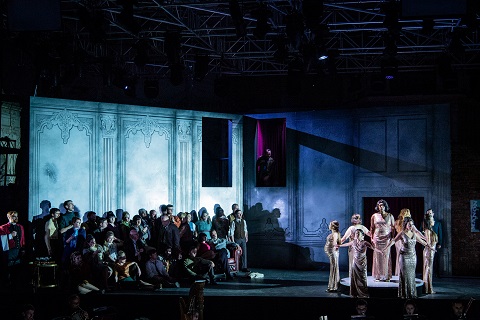
06 Jun 2019
Manon Lescaut opens Investec Opera Holland Park's 2019 season
At this end of this performance of Puccini’s Manon Lescaut at Investec Opera Holland Park, the first question I wanted to ask director Karolina Sofulak was, why the 1960s?
English Touring Opera are delighted to announce a season of lyric monodramas to tour nationally from October to December. The season features music for solo singer and piano by Argento, Britten, Tippett and Shostakovich with a bold and inventive approach to making opera during social distancing.
This tenth of ten Live from London concerts was in fact a recorded live performance from California. It was no less enjoyable for that, and it was also uplifting to learn that this wasn’t in fact the ‘last’ LfL event that we will be able to enjoy, courtesy of VOCES8 and their fellow vocal ensembles (more below …).
Ever since Wigmore Hall announced their superb series of autumn concerts, all streamed live and available free of charge, I’d been looking forward to this song recital by Ian Bostridge and Imogen Cooper.
The Sixteen continues its exploration of Henry Purcell’s Welcome Songs for Charles II. As with Robert King’s pioneering Purcell series begun over thirty years ago for Hyperion, Harry Christophers is recording two Welcome Songs per disc.
Although Stile Antico’s programme article for their Live from London recital introduced their selection from the many treasures of the English Renaissance in the context of the theological debates and upheavals of the Tudor and Elizabethan years, their performance was more evocative of private chamber music than of public liturgy.
In February this year, Albanian soprano Ermonela Jaho made a highly lauded debut recital at Wigmore Hall - a concert which both celebrated Opera Rara’s 50th anniversary and honoured the career of the Italian soprano Rosina Storchio (1872-1945), the star of verismo who created the title roles in Leoncavallo’s La bohème and Zazà, Mascagni’s Lodoletta and Puccini’s Madama Butterfly.
Evidently, face masks don’t stifle appreciative “Bravo!”s. And, reducing audience numbers doesn’t lower the volume of such acclamations. For, the audience at Wigmore Hall gave soprano Elizabeth Llewellyn and pianist Simon Lepper a greatly deserved warm reception and hearty response following this lunchtime recital of late-Romantic song.
Collapsology. Or, perhaps we should use the French word ‘Collapsologie’ because this is a transdisciplinary idea pretty much advocated by a series of French theorists - and apparently, mostly French theorists. It in essence focuses on the imminent collapse of modern society and all its layers - a series of escalating crises on a global scale: environmental, economic, geopolitical, governmental; the list is extensive.
For this week’s Live from London vocal recital we moved from the home of VOCES8, St Anne and St Agnes in the City of London, to Kings Place, where The Sixteen - who have been associate artists at the venue for some time - presented a programme of music and words bound together by the theme of ‘reflection’.
'Such is your divine Disposation that both you excellently understand, and royally entertaine the Exercise of Musicke.’
Amongst an avalanche of new Mahler recordings appearing at the moment (Das Lied von der Erde seems to be the most favoured, with three) this 1991 Mahler Second from the 2nd Kassel MahlerFest is one of the more interesting releases.
‘And there was war in heaven: Michael and his angels fought against the dragon; and the dragon fought and his angels, And prevailed not; neither was their place found any more in heaven … that old serpent … Satan, which deceiveth the whole world: he was cast out into the earth, and his angels were cast out with him.’
If there is one myth, it seems believed by some people today, that probably needs shattering it is that post-war recordings or performances of Wagner operas were always of exceptional quality. This 1949 Hamburg Tristan und Isolde is one of those recordings - though quite who is to blame for its many problems takes quite some unearthing.
There was never any doubt that the fifth of the twelve Met Stars Live in Concert broadcasts was going to be a palpably intense and vivid event, as well as a musically stunning and theatrically enervating experience.
‘Love’ was the theme for this Live from London performance by Apollo5. Given the complexity and diversity of that human emotion, and Apollo5’s reputation for versatility and diverse repertoire, ranging from Renaissance choral music to jazz, from contemporary classical works to popular song, it was no surprise that their programme spanned 500 years and several musical styles.
The Academy of St Martin in the Fields have titled their autumn series of eight concerts - which are taking place at 5pm and 7.30pm on two Saturdays each month at their home venue in Trafalgar Square, and being filmed for streaming the following Thursday - ‘re:connect’.
The London Symphony Orchestra opened their Autumn 2020 season with a homage to Oliver Knussen, who died at the age of 66 in July 2018. The programme traced a national musical lineage through the twentieth century, from Britten to Knussen, on to Mark-Anthony Turnage, and entwining the LSO and Rattle too.
With the Live from London digital vocal festival entering the second half of the series, the festival’s host, VOCES8, returned to their home at St Annes and St Agnes in the City of London to present a sequence of ‘Choral Dances’ - vocal music inspired by dance, embracing diverse genres from the Renaissance madrigal to swing jazz.
Just a few unison string wriggles from the opening of Mozart’s overture to Le nozze di Figaro are enough to make any opera-lover perch on the edge of their seat, in excited anticipation of the drama in music to come, so there could be no other curtain-raiser for this Gala Concert at the Royal Opera House, the latest instalment from ‘their House’ to ‘our houses’.
"Before the ending of the day, creator of all things, we pray that, with your accustomed mercy, you may watch over us."

At this end of this performance of Puccini’s Manon Lescaut at Investec Opera Holland Park, the first question I wanted to ask director Karolina Sofulak was, why the 1960s?
The decade when black-and-white was trumped by technicolour; when Mary Quant’s mini-skirts liberated women, and when freedom of physical movement was matched by new opportunities for women that would have seemed equally outrageous just a few years before; when the legalisation of the pill meant that feminine dreams and aspirations soared beyond marriage and motherhood. The years which saw the rise of ‘second-wave’ feminism hardly seem an apt moment in history to choose to tell a tale of the derision, punishment and death of a ‘fallen woman’?
Second, given that it is the ‘gaze’ of her lovers and of society at large -
a gaze which objectifies her as something to be looked at, a bird in a
golden cage - which is the destructive force which drives Manon’s to
self-damage, despair and finally death, why do Sofulak and designer George
Johnson-Leigh give us so little to look at? “Heavens, how
beautiful she is!” cries Des Grieux when he sees Manon for the first time,
as the students reassure him that this “fair and divine angel
has come from heaven for your delight”. “She is too lovely!” marvels
Geronte. “Am I beautiful?” Manon asks herself as she anxiously awaits Des
Grieux’s arrival. Admiring herself in the mirror she delights, “Oh, I shall
be the most beautiful!” Surely, we should be as compelled by the spectacle
which is Manon’s tragic history as are those whose eyes are drawn to, and
mesmerised by, the eponymous heroine herself?
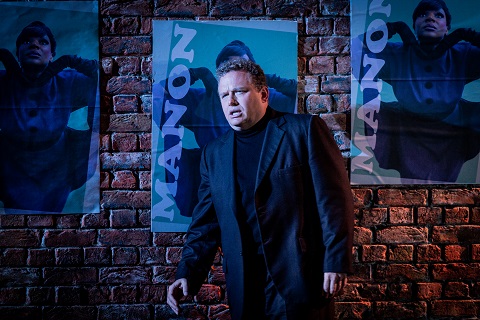 Peter Auty as Les Grieux. Photo credit: Robert Workman.
Peter Auty as Les Grieux. Photo credit: Robert Workman.
Sofulak and Johnson-Leigh eschew the four settings which Puccini’s team of librettists drew from Abbé Prévost’s 1731 novel, L’Histoire du Chevalier des Grieux et de Manon Lescaut. This is a pity as the original settings form four distinct tableaux which take us from Amiens to Paris, on to Le Havre and finally to Louisiana, articulating through the progression of time and place the stages of Manon’s tragedy, and thereby binding the discontinuous plot.
Instead of the public squares in Amiens and Le Havre, we have a club-bar, in Acts 1 and 3, where the ‘students’ party - singing, drinking, doing The Twist, playing Twister (they don’t appear to be smoking marijuana or taking LSD). Geronte’s sumptuous Parisian salon is replaced by a down-at-heel pad, furnished with some shabby red chesterfields and a drab dressing-table. And, finally, the parched Louisiana wasteland near New Orleans is swapped for a brick wall and a lamppost. We are ‘anywhere’ and ‘nowhere’. This Manon does not so much as die in the desert as expire in a deserted street, dissolving enigmatically into the darkness.
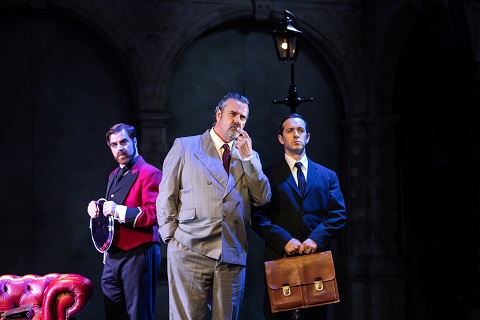 Stephen Aviss as Edmondo, Stephen Richardson as Geronte di Ravoir and Alistair Sutherland as Innkeeper/Sergeant. Photo credit: Ali Wright.
Stephen Aviss as Edmondo, Stephen Richardson as Geronte di Ravoir and Alistair Sutherland as Innkeeper/Sergeant. Photo credit: Ali Wright.
Admittedly, the busy action of Act 1 is well-choreographed (Tim Claydon), and the stage action and stage music - with the Opera Holland Park Chorus in strong voice - create a fertile ambience for the first meeting of Des Grieux and Manon. Stephen Aviss’s Edmondo and Alistair Sutherland’s bartender make a particularly strong impression. But, surely no one would be enticed by the ‘luxury’ of Geronte’s apartment; and, no would-be Jean Shrimpton or Twiggy would be seen dead in the ghastly green and blue get-up that Manon wears.
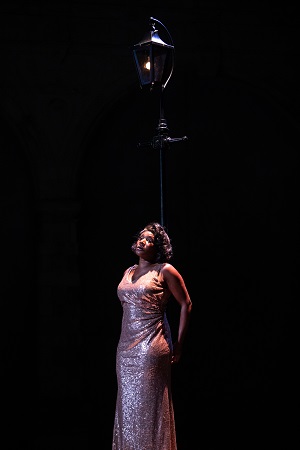 Elizabeth Llewellyn as Manon. Photo credit: Ali Wright.
Elizabeth Llewellyn as Manon. Photo credit: Ali Wright.
The good news is that there is much fine singing to enjoy. The announcement pre-curtain that soprano Elizabeth Llewellyn had only recently recovered from laryngitis was inauspicious, and Llewellyn understandably played it safe at first. But, when in the latter stages, reassured that her voice would hold out, she relaxed and released a wonderfully expressive and dramatic flood of glorious colour, the wait was proven more than worthwhile. In fact, the slight frailty at the start was not inapt, capturing as it did some of the innocence of the young Manon (especially as she is not presented here as a young girl being escorted to a convent), and the blossoming of Llewellyn’s soprano in the final two Acts communicated the maturity and growth borne of Manon’s experiences. Llewellyn exploited the full range of her soprano, including a rich chest voice, encompassing a vast emotional spectrum and sensitively capturing Manon’s femininity. As Manon finds herself at the limits of her resilience, so Llewellyn pushed her soprano to its limits, though never sacrificing her creamily smooth legato, with compelling power and effect. As her voice recovers fully, Llewellyn’s performance will be a persuasive reason to see this production.
Tenor Peter Auty was consistent and strong as Des Grieux. Auty displayed just one timbre (fittingly Italianate) and employed a single volume (loud), but he negotiated the rises to the top smoothly, if without subtlety, and sang with intensity, just about usustaining the vocal passion to the close. It was a pity that such vocal intensity was not matched by dramatic credibility: there was no hint of the light-hearted student of the first scene, nor of the bewitched lover. For there was a strange sense of disengagement between the two lovers and the love duet didn’t make the theatrical impact that it should - though that’s perhaps not surprising when the pair were so often positioned yards apart even as Manon pleads, “In your arms clasp Manon who loves you! … hold me close to your breast!”
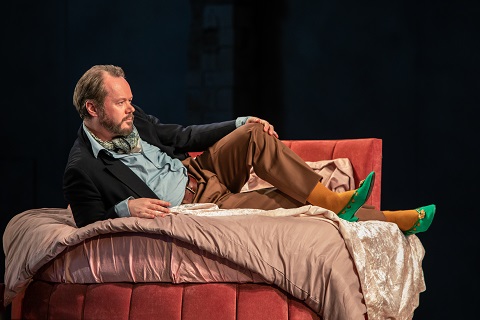 Paul Carey Jones as Lescaut. Photo credit: Ali Wright.
Paul Carey Jones as Lescaut. Photo credit: Ali Wright.
Puccini doesn’t lavish much time and attention on Lescaut, but Paul Carey Jones made more of this amateur pimp than both score and libretto imply. His baritone is light and slick - just right for this oleaginous conman. Stephen Richardson was a similarly unpleasant Geronte, cruel, authoritative and vocally powerful. Ellie Edmonds’ Singer and John Wood’s Dancing Master both made a strong impression.
Conductor Peter Robinson drew a disciplined performance from the City of London Sinfonia; the Act 3 intermezzo was particularly absorbing, the strings sounding plusher than their numbers should have allowed. Elsewhere, while there was attention to detail, there was sometimes a lack of Puccinian sentimentality, but Robinson paced the drama effectively.
Sofulak’s production has one, significant redeeming feature. If Manon’s arrest at the end of Act 2 passes by practically unnoticed, then her humiliation in Act 3 is superbly staged. The roll call of prostitutes become a parade of replica Manons - glittering in identikit gold lame gowns, expressions frozen in contemptuous indifference. As they form a circle around Llewellyn now our gaze is fixated on the visual spectacle on stage, just as the sneering oglers feast on the women displayed before them. There is delight but also discomfort as, at last, the raw power and theatrical punch of Puccini’s score makes its mark.
Claire Seymour
Puccini: Manon Lescaut
Manon Lescaut - Elizabeth Llewellyn, Chevalier des Grieux - Peter Auty, Lescaut - Paul Carey Jones, Geronte de Revoir - Stephen Richardson, Edmondo - Stephen Aviss, Singer - Ellie Edmonds, Dancing Master - John Wood, Innkeeper/Sergeant of the Royal Archers - Alistair Sutherland, Backing Singers (Hannah Boxall, Susie Buckle, Lara Rebekah Harvey, Ayaka Tanimoto), Shadow Manons (Angelica Barroga, Isabella Martinez, Hanan Mugga); Director - Karolina Sofulak, Conductor - Peter Robinson, Designer - George Johnson-Leigh, Lighting - Rory Beaton, Choreographer - Tim Claydon, Opera Holland Park Chorus, City of London Sinfonia.
Investec Opera Holland Park, London; Tuesday 4th June 2019.